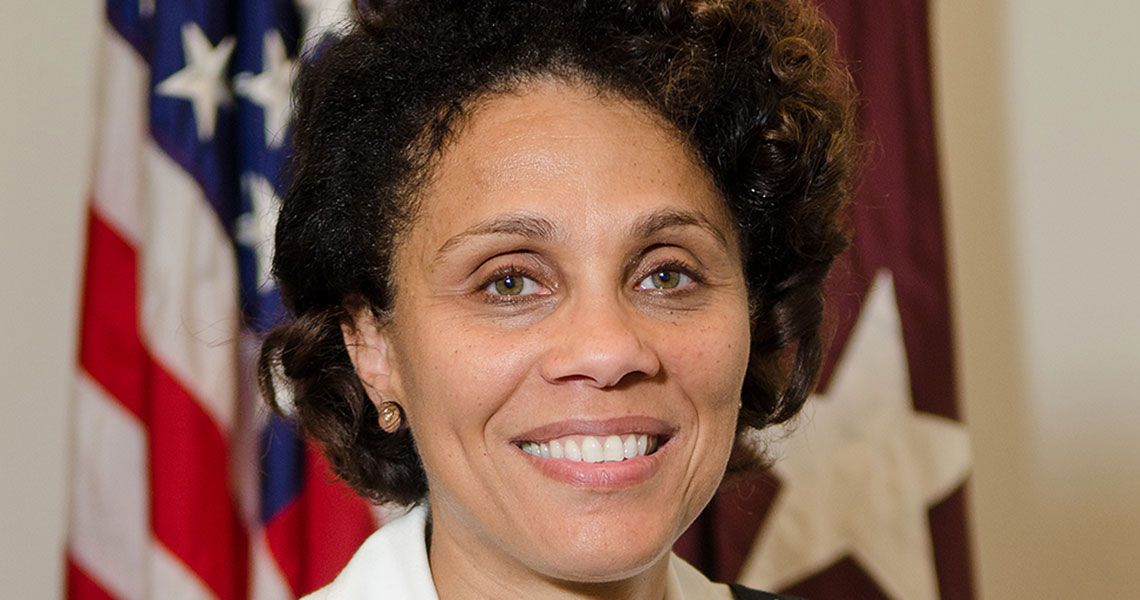Major General Nadja West, M.D. ’88, has a clear memory of her first day at GW’s School of Medicine and Health Sciences (SMHS). “I was fresh out of West Point,” West says of that day 30 years ago. “In the military everyone stands at attention, so when the professor came into the classroom I almost stood up. I looked around and realized ‘I guess they don’t do that here,’” she recalls with a laugh. West, the United States Army Medical Command’s first female African-American two-star general, serves as the Joint Staff surgeon at the Pentagon in Washington, D.C. She remembers her time as a GW medical student fondly, despite the transition from a structured military academy to a civilian education system.
In her current role as the senior medical officer on the Joint Staff, West serves as medical advisor to General Martin Dempsey, the chair of the Joint Chiefs of Staff. “My role is primarily administrative at this point, but I get to do a lot of incredibly interesting things,” says West. “As the U.S. representative to the NATO committee on military medical chiefs, I get to represent the United States if we ever have to use our military medical assets for deployments or humanitarian assistance.”“It was a great environment,” she says, “very conducive to learning.” West especially appreciated that her classmates hailed from all across the country. “We had a California clique who would wear Hawaiian shorts and flip-flops to class. Coming from the military, I thought that was neat,” she recalls.
West also represents the medical requirements of the nine unified combatant commands worldwide, interacting with the service surgeons general (for the Army, Navy, and Air Force) and the medical officer of the Marine Corps. She says that her first experiences in operational medicine “brought home the uniqueness of being a military medical provider.”
“During my residency, I had the opportunity to deploy with the 197th, the infantry brigade during Operation Desert Shield/Desert Storm,” West explains. “That was my first taste of medicine outside of the hospital, and I found it very rewarding to use my skills as a physician in an environment where they were critically needed.
“I can’t think of a better group of people to be charged to take care of than soldiers, sailors, airmen, Marines, coast guardsmen, and their families,” West says. “Look at what we ask them to do. They go to scary places where they might be hurt or killed on behalf of their country. We ask them to spend long periods of time away from their families. How can you not be proud of taking care of people like that?” she asks. “It’s about the camaraderie, it’s about the team.”
Having grown up in a military family — “Dad had his own mini draft for the family” — and graduated from the United States Military Academy at West Point in 1982, just six years after the institution admitted its first female cadets, West always knew she would serve her country. She was a self-described “nerd” in high school, who enjoyed the sciences but also liked helping people. “Medicine was a good opportunity to combine both interests,” she says.
After completing her family medicine residency at Martin Army Community Hospital in Fort Benning, Ga., West pursued a dermatology residency at Fitzsimons Army Medical Center in Aurora, Colo. West credits Carmen Myrie Williams, M.D., a dermopathologist who served on the SMHS faculty until 1997, with her own interest in dermatology. “There were very few African-American physicians there at the time, so she was a real role model for me. She’s a brilliant doctor and was very enthusiastic about her specialty,” West recalls.
West’s reintroduction to the SMHS community after decades of traveling the globe with the military came in the form of another early mentor, Jehan (Gigi) El-Bayoumi, M.D., RESD ’86, associate professor of medicine, associate professor of prevention and community health, and founding director of the Rodham Institute at SMHS. West says that she aimed to emulate El-Bayoumi, who was a resident when West was still in medical school. “In addition to being incredibly smart, she was kind and compassionate,” West says.
El-Bayoumi recalls West with the same fondness. “It’s really something else to hear that one of your former students is now a major general,” El-Bayoumi says. “She showed her abilities as a leader at an early age through her poise, intelligence, grace, compassion, and kindness, while always maintaining a polite, professional, and respectful demeanor.” El-Bayoumi reports that when she reconnected with West during the GW Women Physicians Networking Luncheon in early 2014, “it was evident that she was the same person I knew all those years ago, but now wearing well-earned stripes.”
West and her husband Donald, a retired army colonel who was a medical task force commander in Afghanistan and Iraq — “another hero,” she says — reside in Bethesda, Md., with their two children, Sydney, 20, and Logan, 17. Self-described “homebodies,” West and her husband enjoy spending what limited free time they have relaxing at home. “People might think that sounds boring,” she says, “but for us it’s pretty cool to be able to sit down and read a book.”
West encourages current SMHS students to take advantage of the opportunity of studying in the nation’s capital and visit wounded warriors at the Walter Reed National Military Medical Center, where her own father, now deceased, worked as a logistician at the time of his retirement. “If you want to feel inspired about what military medicine does, see how appreciative these men and women are for the care they’ve received. It’s right here,” she says. “It’s the reason the military health system exists: to take care of brave men and women like them.”



